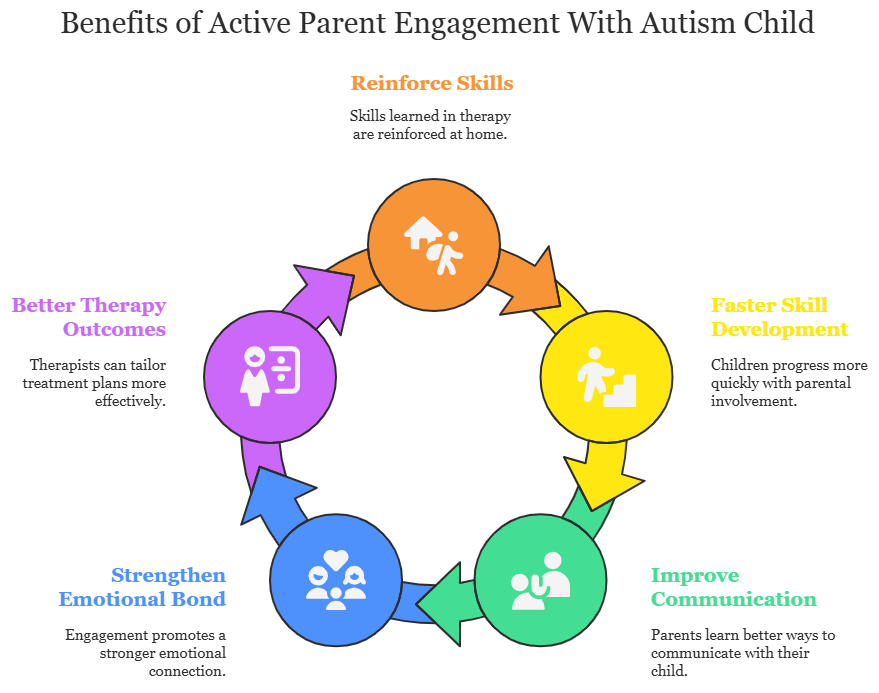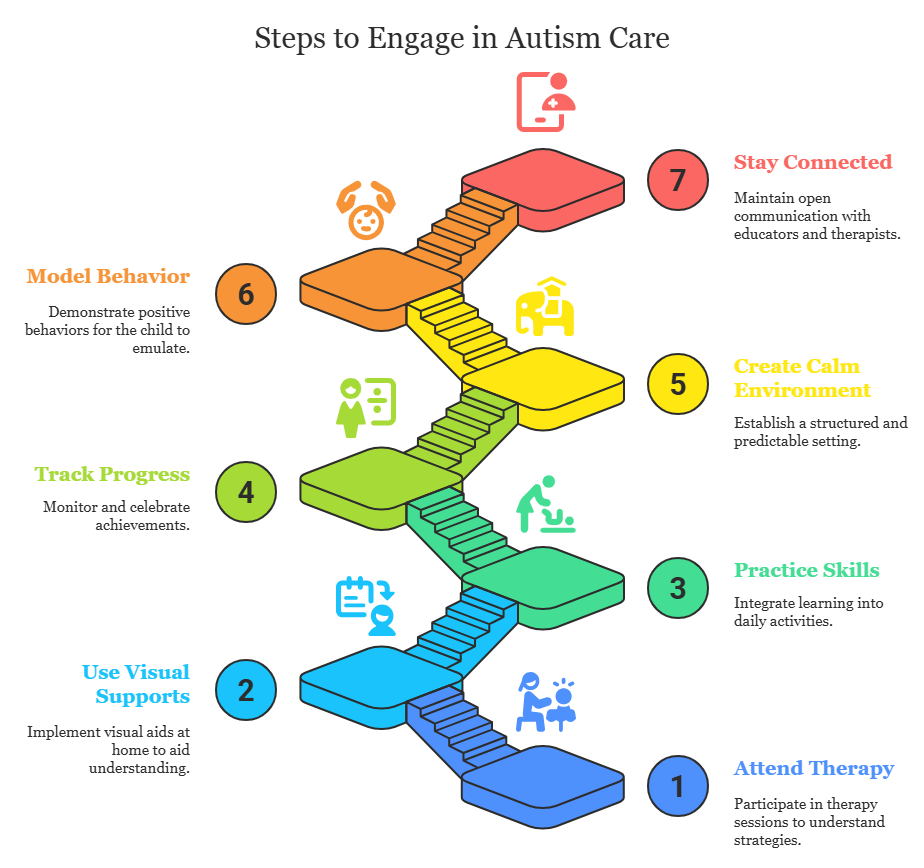Parent engagement plays a powerful role in the development of children with Autism Spectrum Disorder (ASD). While therapies such as Applied Behavior Analysis (ABA) are crucial for supporting children’s growth, they become even more effective when parents are active participants in the process. Your love, presence, and involvement can positively impact your child’s learning, communication, behavior, and emotional development. In this guide, we’ll explore why your role is so important and provide practical, research-backed ways to stay engaged in your child’s progress.

The Importance of Parent Engagement in Autism Care
When parents are actively involved in autism care, the results can be transformative. Studies have shown that children whose parents participate in therapeutic programs often show greater improvement in social skills, language, and behavior regulation. Parent involvement helps therapists understand the child better and ensures that therapy strategies extend beyond the clinic or classroom into real-life situations.
Your child’s journey isn’t limited to therapy sessions, it continues at home, in the park, at family gatherings, and in everyday interactions. As a parent, you are your child’s first and most consistent teacher. By working hand-in-hand with professionals, you can help your child practice skills in natural environments, reinforce positive behaviors, and build emotional connections that foster trust and growth.
Benefits of Active Parent Engagement
1. Consistency Across Environments
When you’re involved, the skills your child learns in therapy are reinforced at home and in other settings. This consistency helps your child generalize new behaviors and skills, making their progress more long-lasting.
2. Faster Skill Development
Children tend to progress more quickly when parents are involved in implementing strategies from therapy. Daily routines become opportunities for learning, whether it’s getting dressed, playing, or mealtime.
3. Improved Communication
As you work with your child and their therapists, you’ll learn better ways to communicate and respond to your child’s needs. This can reduce frustration for both of you and help your child feel more understood and supported.
4. Stronger Emotional Bond
Engagement promotes connection. Being actively involved shows your child they are loved and supported unconditionally. This bond is crucial for their emotional well-being.
5. Better Outcomes in Therapy
Therapists rely on input from parents to tailor treatment plans. When you share observations and insights, therapists can make more informed decisions, leading to better results.
You Might Also Like To Read: The Role of Parents in ABA Therapy: Tips for Supporting Your Child’s Progress
Simple Ways to Engage with Your Child’s Autism Care

You don’t need to be a trained therapist to help your child thrive. Here are some realistic and doable ways to stay involved:
1. Attend Therapy Sessions
If possible, sit in on sessions or schedule regular check-ins with your child’s ABA provider. Ask questions, observe strategies, and discuss how to use similar techniques at home.
2. Use Visual Supports at Home
Many children with autism benefit from visual schedules and cues. Ask your provider to help you create charts or symbols that match what your child uses in therapy.
3. Practice Skills During Daily Routines
Turn routine activities into learning moments. For example, ask your child to follow simple instructions while cooking, name objects during play, or use calming strategies before bedtime.
4. Track Progress and Celebrate Wins
Keep a simple notebook or use a phone app to track your child’s improvements. Celebrate both small and big milestones to keep motivation high for both of you.
5. Create a Calm, Structured Environment
Children with autism often feel more secure with routine. Set up predictable schedules and consistent expectations. Use timers or visual clocks to help with transitions.
6. Model Positive Behavior
Children often learn by watching. Use calm tones, show patience, and demonstrate how to handle frustration or change. These behaviors can help your child mirror healthy responses.
7. Stay Connected with Educators and Therapists
Communication is key. Share updates with your child’s team, report new challenges, and be open about what’s working or not at home. This helps align your child’s care across all environments.
Read More: Why Early Autism Screening is Crucial for Your Child’s Development
Common Barriers and How to Overcome Them
Even when you want to be involved, life can make it hard. Here are some common obstacles and tips to manage them:
- Time Constraints: Try integrating therapy strategies into regular routines instead of adding new tasks.
- Lack of Confidence: Remember, no one knows your child better than you. Ask your therapy team for support and don’t be afraid to ask questions.
- Stress and Burnout: Take care of your own mental health. Join a support group, talk to other parents, or speak with a counselor.
Final Thoughts: Your Role Is Powerful
Parent engagement isn’t just helpful, it’s essential. The more involved you are, the more supported your child will feel, and the better the outcomes will be. You are your child’s strongest advocate, and your consistent involvement is one of the most valuable parts of their autism journey.
At ABC Achieve, we believe in partnering with parents every step of the way. Together, we can create a nurturing environment where your child can grow, thrive, and reach their full potential.
You Can Also Check These Parent’s Guides:
- Understanding Behavior Intervention Plans (BIP): A Guide for Parents
- Suggestions for ASD Parents | Best Parenting Strategies
- Recognizing the signs of Autism Spectrum Disorder
A 2022 analysis of 51 randomized controlled trials found that parent-implemented interventions for children with autism produced a moderately strong improvement in core developmental areas (effect size g = 0.55) covering social skills, communication, behavior, and adaptive functioning. (Source: PubMed)
Reference:
- Trembath et al. (2019) – Meta-analysis of 51 randomized controlled trials found a moderately strong effect (g = 0.55) of parent-implemented interventions on children’s social skills, language, behavior, and adaptive functioning. (ResearchGate)
- Nevill & Lecavalier (2018) – Review of 19 RCTs showing small to moderate improvements (Hedges’ g ≈ 0.23) in ASD symptoms, communication, cognition, and socialization with parent involvement. (Springer Nature)
- PACT / iBASIS-VIPP Trials – Parent-mediated interventions under 3 years demonstrated specific gains in parent–child interaction (g ≈ 0.20–0.35), adaptive skills, and social communication.
- Law et al. (2018) – Systematic review finding parent-mediated language interventions yielding significant effects on expressive and receptive language in children 18–60 months old.
- Kasari et al. (2015) – JASPER intervention trials reported strong effect sizes (g = 0.59) for improved parental responsiveness when parents were coached in social communication techniques.



